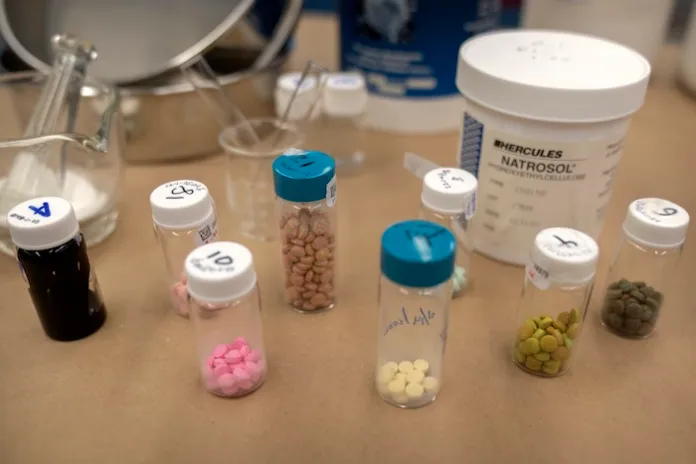The Chinese government’s announcement that it will now require licenses for the exportation of the precursor chemicals that can be turned into fentanyl for shipment to North America will force entities creating the extremely lethal opioid to push it through different avenues, one of which could be India.
China’s Ministry of Commerce, in conjunction with four other government departments, announced the policy last Monday, and it took effect immediately. These chemicals can still be exported to places outside of North America without needing a license.
This announcement, which FBI Director Kash Patel highlighted during Wednesday’s White House press briefing, is the latest development in the continuous cat-and-mouse game played by traffickers and law enforcement as one side adjusts its tactics to respond to the other’s evolution.
“China is fully implementing the important consensus reached by President Xi Jinping and President Trump at their meeting in Busan,” Liu Pengyu, a spokesperson with the Chinese Embassy, told the Washington Examiner.
The embassy did not respond to additional questions about the export license process.
“The obvious point for this is that it’s a welcome development, and I think what is significant about this is that it seems like what China is signaling here is that they’re willing to take a more systematic approach to dealing with the issue by exercising control over these precursors,” Jonathan Czin, a fellow in the John L. Thornton China Center at the Brookings Institution, told the Washington Examiner, though he called the effort “a perpetual game of whack-a-mole.”
This announcement is “focused on the current supply routes for fentanyl,” he said, adding that “I would anticipate the cartels and other entities involved in this are going to now move to find alternative routes to getting to the U.S. market.”
China has one of the largest pharmaceutical industries in the world, with hundreds of companies that manufacture active pharmaceutical ingredients. Some send precursors to Mexico, legally and illegally.
Czin said the “sprawling and vast industry” will make it “relatively easy for them to get around this,” even if the Chinese government is “acting in good faith.”
Fentanyl is an extremely lethal synthetic opioid. As little as 2 milligrams of it could be enough to trigger a fatal overdose, according to a Government Accountability Office report. Synthetic opioids, primarily fentanyl, accounted for about 60% of all overdose deaths in the United States last year, which was roughly 48,000 people.
“As long as there is profit, there will, and as long as there is demand, there will always be flow,” Zoe Zongyuan, a senior fellow for China Studies at the Council on Foreign Relations, told the Washington Examiner. “So I’d say cutting chemicals itself is not important. It is necessary, but not sufficient.”
Many of the precursor chemicals, she told the Washington Examiner, have legitimate non-nefarious purposes, such as making food colors and lubricants.
Mexican cartels that want to keep smuggling fentanyl into the U.S. will look to get the precursor chemicals from companies outside China if the export licenses pose a hindrance to their operation, and a primary candidate to fill that opening is India, which also has a major pharmaceutical industry and ties to the practice already.

“China is not the only API producer,” Zongyuan said. “There is also India. Once India, like China, export it to the makers of synthetic drugs, it feeds into the supply chain. The logic is similar. It’s just that folks have been focusing primarily on China, not necessarily putting a lot of attention on Indian pharmaceutical makers, or for that matter, API makers.”
Leaders from China and the U.S. have met numerous times over many years to discuss how to curb drug smuggling and with varying degrees of cooperation from both sides. Czin noted that there is a possibility Beijing could pull back on enforcement of these export license requirements if it deems it beneficial for its own objectives.
China banned the production of fentanyl in 2019, fulfilling a pledge Xi made to President Donald Trump in 2018 during his first term. The announcement prompted nefarious actors to begin shipping the precursor chemicals to other countries, where it is then made into fentanyl.
“Originally China was making the fentanyl itself, but earlier rounds of intervention apparently succeeded in getting the Chinese producers to switch from the fentanyl itself to chemicals that could be converted into fentanyl,” Dr. Jonathan Caulkins, a professor at Carnegie Mellon University’s Heinz College, told the Washington Examiner. “The Mexican producers did not find it very difficult to recruit — they call them chemists — but that’s sort of a generous term.”
There have also been instances of Chinese companies attempting to sell the precursors to Americans directly.
KASH PATEL SAYS CHINA AGREED TO STOP PRODUCTION OF FENTANYL INGREDIENTS
In October 2024, the Justice Department charged eight China-based chemical companies and eight employees in the Middle District of Florida who were accused of shipping precursor chemicals to the Sunshine State, and in September 2025, the DOJ charged three U.S. citizens in Ohio, 22 Chinese nationals, and four Chinese pharmaceutical companies for narcotics and money laundering conspiracies.
Trump has also worked with Mexican President Claudia Sheinbaum on stopping the cartels in her country.
She has let the CIA expand surveillance flights, deployed 10,000 troops to the U.S. border, and extradited 55 senior cartel members to the U.S. The president has reportedly considered using lethal military force to target the labs the cartels use to manufacture fentanyl, which she pushed back on at the time.
